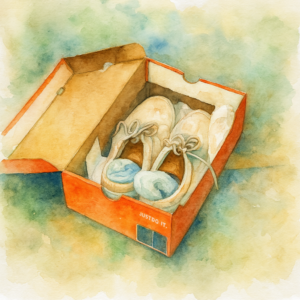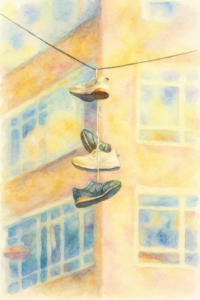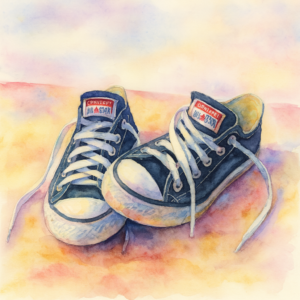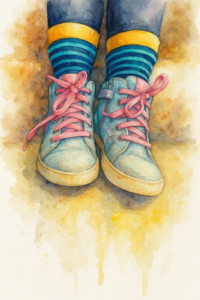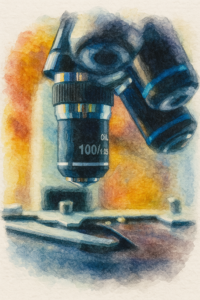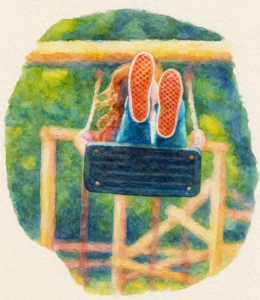Learn French with this clip from Les P’tits Bateaux. Find the full episode here. We do not own the content. The above audio sample and transcription is from Les P’tits Bateaux podcast. We do not own the content. Listen to the entire episode here. The cliff What’s opening up for you with this clip? Comment…
Start quiz, type what you hear, then join the conversation.
Did you find this one challenging or easy? Did you hear something diffferent? What surprised you? What levels did you complete? Comment below and share what’s opening up for you with this quiz.
Learn French with this clip from Les P’tits Bateaux. Find the full episode here. We do not own the content.
The above audio sample and transcription is from Les P’tits Bateaux podcast. We do not own the content. Listen to the entire episode here.
The cliff
What’s opening up for you with this clip? Comment below with what was surprising, easy, challenging and/or interesting.
The snippet in English
Find a translation of this snippet here, how much of this did you hear?
Et donc, c’est là. ça vient de là, qu’on essaye de grimper.
(Et alors) Ce qui est intéressant, c’est que ça s’autonomise : c’est-à-dire que ceux qui vont seulement à Fontainebleau ou que sur la falaise de la Varappe près de Genève considèrent que, en soi, c’est plus intéressant de faire ça.
Il y a des qualités de rythme pour grimper, de technique de grimpe, de style, qui en fait font que c’est plus intéressant que faire une ascension d’un sommet.
And so, that’s where it comes from, that’s where we try to climb.
What’s interesting is that it’s becoming autonomous: in other words, those who only go to Fontainebleau or the Varappe cliff near Geneva consider that, in itself, it’s more interesting to do that.
There are qualities of climbing rhythm, climbing technique and style that make it more interesting than climbing a summit.
The above translation from Deepl
What does “grimper” mean?
grimper — (to climb)
Il a grimpé à l’arbre pour récupérer son cerf-volant.
(He climbed the tree to retrieve his kite.)
Usage notes: Common in both literal and figurative senses. Informal but standard in spoken and written French. Can refer to climbing objects (arbre, montagne) or rising values (les prix grimpent).
Cultural note: In casual speech, grimper is also used figuratively, especially with emotions or prices: la tension grimpe, les loyers grimpent. It suggests a rapid or noticeable rise.
What does “la falaise” mean?
la falaise — (cliff)
Ils marchaient le long de la falaise en admirant la vue sur la mer.
(They walked along the cliff, admiring the view of the sea.)
Usage notes: Used for steep, often coastal or mountainous rock faces. Neutral and standard in all contexts.
Cultural note: France has many iconic falaises, especially along the Normandy coast (e.g. les falaises d’Étretat), often featured in art, literature, and tourism. The word evokes dramatic landscapes and natural beauty.
What does “en soi” mean?
en soi — (in itself / in and of itself)
L’idée n’est pas mauvaise en soi, mais sa mise en œuvre pose problème.
(The idea isn’t bad in itself, but its implementation is problematic.)
Usage notes: Formal or neutral; common in both spoken and written French. Used to isolate the essence of a thing or concept, separate from context or consequences.
Cultural note: Often appears in debates, essays, or nuanced arguments. It adds intellectual weight, signaling careful thought or qualification.
What does “faire une ascension” mean?
faire une ascension — (to make a climb / ascent)
Ils ont fait une ascension difficile jusqu’au sommet du Mont-Blanc.
(They made a difficult ascent to the summit of Mont Blanc.)
Usage notes: Slightly formal or literary. Used mostly for notable climbs—mountains, peaks, or symbolic achievements. Not typically used for casual or everyday climbing.
Cultural note: In French-speaking mountaineering culture, faire une ascension often implies planning, effort, and a sense of accomplishment. It’s tied to a tradition of alpinisme with strong roots in the Alps.
Les P’tits Bateaux Podcast
Official synopsis: Les enfants posent des questions, des spécialistes leur répondent. Jeunes (et moins jeunes !) peuvent poser toutes les questions possibles et imaginables directement par message vocal via franceinter.fr, sauf pendant les vacances.
I recently discovered this podcast from InterFrance and love it. It’s kids posing questions and the host brings in experts to explain. And it’s aimed at young French kids, not French learners. That’s my favorite kind of content. Being for French kids is what makes it so good.
You’ve got real people (a kid, a host, and an expert), all speaking real French — no AI generated stuff here. The kid asks a question, and then an expert explains it in short, clear language. There’s a ton of repetition, natural turns of phrase, and just enough challenge to keep your ears working.
And because it’s meant for French-speaking kids, the adults naturally explain things simply but not condescendingly. You get exposed to rhythm, tone, interjections (bah, ben, alors), and full sentences — but also some real dialogue dynamics. And that’s gold if you’re trying to move from textbook filler to actually speaking and thinking in French.
Improving your French Listening Comprehension with Podcasts
On this site, fast spoken French is finally accessible to all levels. The tool break podcasts into short clips each set to transcription fill-in-the-blank practice. My favorite practice in class is always dictées. While they can seem overwhelming at first, the confidence boost and skills payoff for doing the work pays off. They’re perfect for anyone at any level, from advanced students to those just starting.
We use podcasts and our practice exercises to make it possible for anyone, anywhere to immerse in French with fun and ease. Join us and enjoy French, one short clip at a time. Let’s learn together!
Make the most of the site:
- Daily Podcast Listening: Start your day with a French podcast from our collection. Choose episodes that align with your interests to keep it engaging.
- Active Listening Practice: As you listen, try to pick out key phrases and vocabulary. Use our daily quizzes to test your understanding and reinforce learning.
- Repeat and Shadow: Listen to the same podcast segment multiple times. Try to mimic the pronunciation and intonation to improve your spoken French.
- Note-taking: Jot down new words or phrases you encounter. Review these notes regularly to enhance vocabulary retention.
- Reflect and Respond: After each episode, summarize the main points in French, either in writing or aloud. This helps in consolidating your learning and improving your expressive skills.
- Read More:
- True Beginner or A1 Learners: discover tips learning with podcasts at an introductory level.
- Discover all the podcast clips on FrenchIRL organized by level.
- Top Tips: Here’s how I make the most of my own site.
I created the French In Real Life project because I wanted to understand more than just my teacher and youtubers who cater to learners. I wanted to understand the French I hear in France. I hope you can benefit as much as I have. Become a supporting member for access to all clips.
What’s opening up for you?
Comment below with what’s opening up for you with this clip. What do you love about this? What was challenging? What was easy? Share your learning progress below!
Learn French with this clip from Les P’tits Bateaux. Find the full episode here. We do not own the content. The above audio sample and transcription is from Les P’tits Bateaux podcast. We do not own the content. Listen to the entire episode here. The cliff What’s opening up for you with this clip? Comment…
Start quiz, type what you hear, then join the conversation.
Did you find this one challenging or easy? Did you hear something diffferent? What surprised you? What levels did you complete? Comment below and share what’s opening up for you with this quiz.


